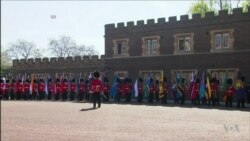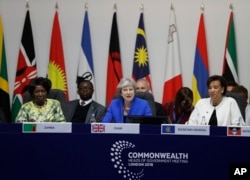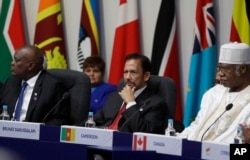Leaders from around the world are gathered in London for the Commonwealth Heads of Government Meeting.
Questions linger over the Commonwealth’s future: what is it for, and what role should the former imperial power Britain play? In her opening address to the summit, Britain’s Queen Elizabeth, the head of the Commonwealth, made it clear she wants its leadership to stay in the family.
“It is my sincere wish that the Commonwealth will continue to offer stability and continuity for future generations. I will decide that one day the Prince of Wales should carry on the important work started by my father in 1949 by continuing to treasure and reinvigorate our associations and activities,” Queen Elizabeth told delegates gathered Thursday at Buckingham Palace.
WATCH: Commonwealth Leaders Ponder Future as Britain Prepares to Exit Europe
The Commonwealth emerged from the breakdown of the British Empire in the last century and critics say it has failed to shake off its colonial legacy. Many argue the organization should sever its royal links – including Professor Philip Murphy, director of the Institute of Commonwealth Studies at the University of London, and author of a new book The Empire's New Clothes: The Myth of the Commonwealth.
“The problem in recent decades, really since the 1990s, is that as the Commonwealth has lost its relevance, it’s lost any really major unifying issue to make it newsworthy, the only really newsworthy thing about the Commonwealth has been the Royal Family.”
Imperial transgressions
The Commonwealth has made headlines this week, but not for reasons the British government intended. Prime Minister Theresa May apologized to the leaders of Caribbean member states, after it emerged migrants who arrived in Britain in the 1950s and 60s from what were then British colonies had been refused residency and threatened with deportation.
“I want to dispel any impression that my government is in some sense clamping down on Commonwealth citizens, particularly those in the Caribbean, who brought a life here,” May told the leaders of several Caribbean countries.
Speaking at the Commonwealth summit, she also later apologized for the role Britain had played in criminalizing same-sex relations in its former colonies.
“I am all too aware that these laws were often put in place by my own country. They were wrong then and they are wrong now.”
Campaigners say millions of gay, lesbian, and transgender people live in fear of arrest across the Commonwealth. Peter Tatchell led a protest outside the Commonwealth headquarters at London’s Marlborough House.
“Thirty-six member states still criminalize same-sex relations. Nine have life imprisonment. And in parts of two countries – Nigeria and Pakistan – gay people can be put to death. Quite clearly the rhetoric of the Commonwealth is not matched by the practice of the governments,” Tatchell told VOA.
Direction unclear
Despite internal tensions, the Commonwealth heads of government meeting has offered tangible progress: billions of dollars pledged to tackle malaria, a crackdown on plastic waste, and a rainforest conservation drive. It also offers a global platform for countries seeking investment, as South Africa’s President Cyril Ramaphosa said earlier this week.
WATCH: Fears Grow Over Malaria Resurgence, London Summit Urges Global Action
“We are trawling, going to trawl the whole world, right from Africa, Asia, Europe, and Americas, both North and South, to try and campaign for investments that will come to South Africa as we are proceeding on our route of building more confidence in our country, in our economy. And coming here, participating in the Commonwealth Heads of Government Meeting is an added boost for us.”
Some British lawmakers want to reinvigorate the Commonwealth after Britain leaves the European Union. That will be difficult, says Professor Philip Murphy.
“The Commonwealth is a rather difficult soft power vehicle for Britain. It may perform good works, it may channel aid through the Commonwealth. But it’s a reminder that Britain used to be the imperial ruler, the imperial master. And there’s still a great deal of resentment about that within the Commonwealth.”
Until that image is shaken off, questions over the purpose and future of the Commonwealth are likely to persist.









